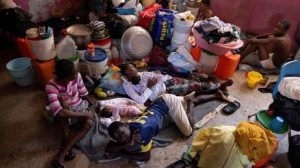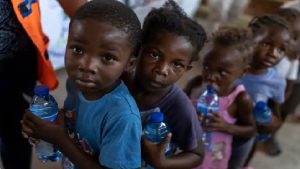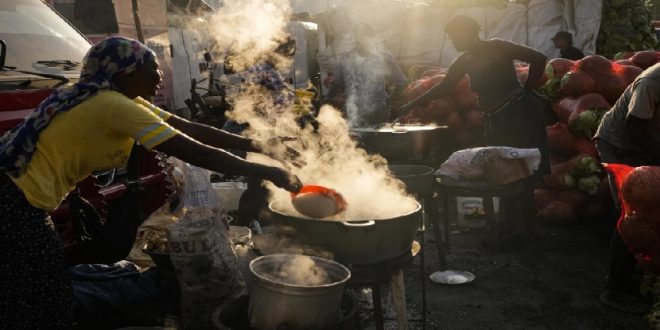24-05-2024
UNITED NATIONS/ PORT-AU-PRINCE: Haiti’s health system is “on the verge of collapse”, the UN children’s agency, UNICEF, has warned, saying six out of 10 hospitals in the country are barely operational.
“The combination of violence, mass displacement, dangerous epidemics, and increasing malnutrition has bent Haiti’s health system,” said Bruno Maes, Unicef’s representative in the Caribbean nation but he stressed that “the strangling of supply chains may be what breaks it”.
 Armed gangs still control much of the capital Port-au-Prince, and UNICEF says millions of children are at risk of disease and malnutrition.
Armed gangs still control much of the capital Port-au-Prince, and UNICEF says millions of children are at risk of disease and malnutrition.
The country has suffered from severe instability since the assassination of President Jovenel Moise in 2021, during which time gangs have increasingly come to control swathes of the country.
Overall, as many as 4.4 million people in the country are in urgent need of food assistance, and 1.6 million people “face emergency levels of acute food insecurity, which increases the risk of child wasting and malnutrition”, UNICEF said.
Port-au-Prince’s international airport reopened earlier this week after nearly three months of closure but UNICEF said it is currently operating with limited capacity and a significant backlog.
The situation in the capital is especially dire, the UN agency said. Containers filled with vital supplies have been either held up or looted, as were many warehouses and pharmacies.
Reginald Fils-Aime, director of strategic planning at the Haiti-based Zanmi Lasante NGO, told media that by “controlling the roads to and from the capital, gangs severely affect the supply chain and all transportation, including healthcare staff and patient transportation”.
Dr Fils-Aime said criminal armed groups also controlled several large areas in the central Artibonite department, where his NGO has been working since the 1980s.
 “Many essential medicines have been in short supply because most come from outside the country. Recently, there was a shortage of IV fluids, diuretics, blood pressure medicine, and beta-blockers.
“Many essential medicines have been in short supply because most come from outside the country. Recently, there was a shortage of IV fluids, diuretics, blood pressure medicine, and beta-blockers.
“Children and babies living in camps for the internally displaced are particularly vulnerable to non-hygienic environments and the water-borne diseases that they spread. Now that the rainy season has started, they are also exposed to vector-borne diseases such as malaria,” Dr Fils-Aimé added.
Nadesh Mijoba, country director of the Haitian Health Foundation (HHF) told the BBC that “there are many areas where the health services that once were available to communities have been closed down due to attacks and even destruction of infrastructure”.
“For others, such as HHF, our patient load is increasing significantly as patients are walking farther distances in search of health services, oftentimes, at very high risks of violence, kidnapping, rape, and even being killed.
“I have been living and working in Haiti for over 11 years now, and I have never seen the humanitarian situation this catastrophic,” Mijoba said.
Kenya is due to deploy police to Haiti at the head of an international taskforce that will try to help the country’s transitional council restore some stability.
The country’s leader, William Ruto, met US President Joe Biden at the White House on Wednesday to discuss the operation.
Dr Fils-Aime said he hoped that Haiti’s main seaport and the roads “will be free in the coming months”. (Int’l Monitoring Desk)
 Pressmediaofindia
Pressmediaofindia




